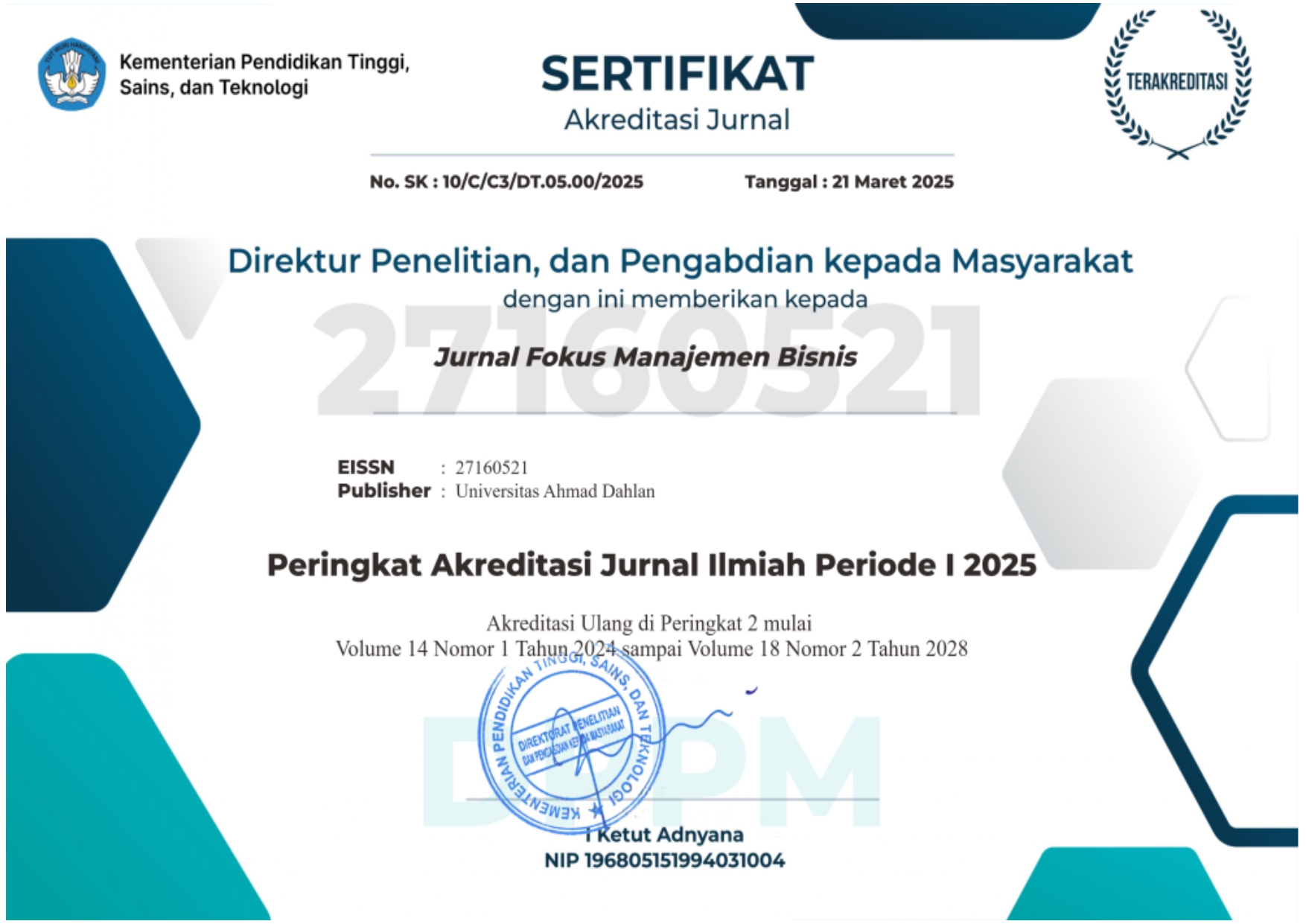TANGGUNG JAWAB SOSIAL PERUSAHAAN PADA KINERJA PERUSAHAAN: PERAN PEMODERASI KEPEMILIKAN PEMERINTAH
DOI:
https://doi.org/10.12928/fokus.v12i2.6285Abstract
This study aims to obtain empirical evidence regarding the impact of independent variables namely corporate social responsibility and state as moderating variables on firm performance. This study analyzes using a sample of 9 companies in the construction sub-sector listed on the Indonesia Stock Exchange for the period 2013-2018 using the purposive sampling technique. The tools used in this research are panel data regression and descriptive statistics. The results of the study show corporate social responsibility has positive effect but no significant on firm performance and state does not moderate the effect of corporate social responsibility on firm performanceThis study aims to obtain empirical evidence regarding the impact of independent variables namely corporate social responsibility and state as moderating variables on firm performance. This study analyzes using a sample of 9 companies in the construction sub-sector listed on the Indonesia Stock Exchange for the period 2013-2018 using the purposive sampling technique. The tools used in this research are panel data regression and descriptive statistics. The results of the study show corporate social responsibility has positive effect but no significant on firm performance and state does not moderate the effect of corporate social responsibility on firm performance.
References
Aggestam, M. (2006). Privatization Ideology And Ownership Change In Poland: An Institutionalist Study. Journal of Applied Behavioral Science, 42(4).
Al-Shammari, M. A., Banerjee, S. N., & Rasheed, A. A. (2022). Corporate Social Responsibility And Firm Performance: A Theory Of Dual Responsibility. Management Decision, 60(6).
Amin-Chaudhry, A. (2016). Corporate Social Responsibility-From A Mere Concept To An Expected Business Practice. Social Responsibility Journal, 12(1).
Bai, X., & Chang, J. (2015). Corporate Social Responsibility And Firm Performance: The Mediating Role Of Marketing Competence And The Moderating Role Of Market Environment. Asia Pacific Journal of Management, 32(2).
Barnea, A., & Rubin, A. (2010). Corporate Social Responsibility as a Conflict Between Shareholders. Journal of Business Ethics, 97(1).
Barnett, M. L., & Salomon, R. M. (2012). Does It Pay To Be Really Good? Addressing The Shape Of The Relationship Between Social And Financial Performance. Strategic Management Journal, 33(11).
Beuselinck, C., Cao, L., Deloof, M., & Xia, X. (2017). The Value Of Government Ownership During The Global Financial Crisis. Journal of Corporate Finance, 42.
Branco, M. C., & Rodrigues, L. L. (2007). Positioning Stakeholder Theory within the Debate on Corporate Social Responsibility. Electronic Journal of Business Ethics and Organization Studies, 12(1).
Brown, S., Gray, D., McHardy, J., & Taylor, K. (2015). Employee Trust And Workplace Performance. Journal of Economic Behavior and Organization, 116.
Brown, W. O., Helland, E., & Smith, J. K. (2006). Corporate Philanthropic Practices. Journal of Corporate Finance, 12(5).
Chen, S. J., Chen, M. H., & Wei, H. L. (2017). Financial Performance Of Chinese Airlines: Does State Ownership Matter? Journal of Hospitality and Tourism Management, 33.
Cornett, M. M., McNutt, J. J., & Tehranian, H. (2009). Corporate Governance And Earnings Management At Large U.S. Bank Holding Companies. Journal of Corporate Finance, 15(4).
Filbeck, G., Gorman, R., & Zhao, X. (2009). The “Best Corporate Citizens”: Are They Good For Their Shareholders? Financial Review, 44(2).
Freeman, R. E. (1994). The Politics of Stakeholder Theory: Some Future Directions. Business Ethics Quarterly, 4(4).
Ghozali, I. (2018). Aplikasi Analisis Multivariate dengan Program IBM SPSS 25 Edisi 9. Badan Penerbit Universitas Diponegoro.
Haider, Z. A., Liu, M., Wang, Y., & Zhang, Y. (2018). Government Ownership, Financial Constraint, Corruption, And Corporate Performance: International Evidence. Journal of International Financial Markets, Institutions and Money, 53.
Hategan, C. D., Sirghi, N., Curea-Pitorac, R. I., & Hategan, V. P. (2018). Doing Well Or Doing Good: The Relationship Between Corporate Social Responsibility And Profit In Romanian Companies. Sustainability (Switzerland), 10(4).
Jensen, M. C., & Meckling, W. H. (1976). Theory Of The Firm: Managerial Behavior, Agency Costs And Ownership Structure. Journal of Financial Economics, 3(4).
Jo, H., & Harjoto, M. A. (2011). Corporate Governance and Firm Value: The Impact of Corporate Social Responsibility. Journal of Business Ethics, 103(3).
Jo, H., & Harjoto, M. A. (2012). The Causal Effect of Corporate Governance on Corporate Social Responsibility. Journal of Business Ethics, 106(1).
Kao, E. H., Yeh, C. C., Wang, L. H., & Fung, H. G. (2018). The Relationship Between CSR And Performance: Evidence In China. Pacific Basin Finance Journal, 51.
Kuncoro, M. (2009). Metode Riset Untuk Bisnis Dan Ekonomi. Erlangga.
La Porta, R., Lopez-de-Silanes, F., Shleifer, A., & Vishny, R. (2002). Investor Protection And Corporate Valuation. Journal of Finance, 57(3).
Lee, J., Graves, S. B., & Waddock, S. (2018). Doing Good Does Not Preclude Doing Well: Corporate Responsibility And Financial Performance. Social Responsibility Journal, 14(4).
Lim, M. H., Kang, Y. S., & Kim, Y. (2017). Effects Of Corporate Social Responsibility Actions On South Korean Adolescents’ Perceptions In The Food Industry. Sustainability (Switzerland), 9(2).
Long, W., Li, S., Wu, H., & Song, X. (2020). Corporate Social Responsibility And Financial Performance: The Roles Of Government Intervention And Market Competition. Corporate Social Responsibility and Environmental Management, 27(2).
Ma, S., Naughton, T., & Tian, G. (2010). Ownership And Ownership Concentration: Which Is Important In Determining The Performance Of China’s Listed Firms? Accounting and Finance, 50(4).
Mahrani, M., & Soewarno, N. (2018). The Effect Of Good Corporate Governance Mechanism And Corporate Social Responsibility On Financial Performance With Earnings Management As Mediating Variable. Asian Journal of Accounting Research, 3(1).
McWilliams, A., & Siegel, D. (2001). Corporate Social Responsibility: A Theory Of The Firm Perspective. In Academy of Management Review (Vol. 26, Issue 1).
Megginson, W. L. (2005). The Economics Of Bank Privatization. Journal of Banking and Finance, 29(8-9 SPEC. ISS.).
Michelon, G., Boesso, G., & Kumar, K. (2013). Examining the Link between Strategic Corporate Social Responsibility and Company Performance: An Analysis of the Best Corporate Citizens. Corporate Social Responsibility and Environmental Management, 20(2).
Narkunienė, J., & Ulbinaitė, A. (2018). Comparative Analysis Of Company Performance Evaluation Methods. Entrepreneurship and Sustainability Issues, 6(1).
Peng, C. W., & Yang, M. L. (2014). The Effect of Corporate Social Performance on Financial Performance: The Moderating Effect of Ownership Concentration. Journal of Business Ethics, 123(1).
Phung, D. N., & Mishra, A. V. (2016). Ownership Structure and Firm Performance: Evidence from Vietnamese Listed Firms. Australian Economic Papers, 55(1).
Preston, L. E., & O’Bannon, D. P. (1997). The Corporate Social-Financial Performance Relationship: A Typology And Analysis. Business and Society, 36(4).
Rahman, A. N. A. A., & Reja, B. A. F. M. (2015). Ownership Structure and Bank Performance. Journal of Economics, Business and Management, 3(5).
Rahman, M., Rodríguez-Serrano, M. Á., & Lambkin, M. (2019). Brand Equity And Firm Performance: The Complementary Role Of Corporate Social Responsibility. Journal of Brand Management, 26(6).
Russo, M. V., & Fouts, P. A. (1997). A Resource-Based Perspective On Corporate Environmental Performance And Profitability. Academy of Management Journal, 40(3).
Shleifer, A., & Vishny, R. W. (1994). Politicians And Firms. Quarterly Journal of Economics, 109(4).
Waddock, S. A., & Graves, S. B. (1997). The Corporate Social Performance-Financial Performance Link. Strategic Management Journal, 18(4).
Widarjono, A. (2018). Ekonometrika: Pengantar dan Aplikasinya, Edisi Keempat. Penerbit UPP STIM YKPN.
Downloads
Published
How to Cite
Issue
Section
License
Copyright (c) 2022 Tri Yuli Tiastuti Susanti, Ardi Paminto

This work is licensed under a Creative Commons Attribution-ShareAlike 4.0 International License.
Authors who publish with this journal agree to the following terms:Â
- Authors retain copyright and grant the journal right of first publication with the work simultaneously licensed under a Creative Commons Attribution License that allows others to share the work with an acknowledgment of the work's authorship and initial publication in this journal.
- Authors are able to enter into separate, additional contractual arrangements for the non-exclusive distribution of the journal's published version of the work (e.g., post it to an institutional repository or publish it in a book), with an acknowledgment of its initial publication in this journal.
- Authors are permitted and encouraged to post their work online (e.g., in institutional repositories or on their website) prior to and during the submission process, as it can lead to productive exchanges, as well as earlier and greater citation of published work (See The Effect of Open Access).







